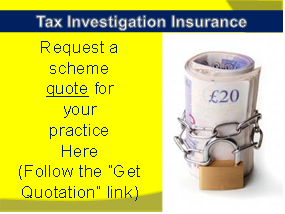My compliments to my chum Elaine Clark for identifying and pointing out this "oddity" wrt the death of a company sometimes killing off the corporation tax debt when there is a communications snafu between Companies House and HMRC.
Tax does have to be taxing.
Professional Cover Against the Threat of Costly TAX and VAT Investigations
Insurance to protect you against the cost of enquiry or dispute with HMRC is available from several sources including Solar Tax Investigation Insurance.
Ken Frost has negotiated a 10% discount on any polices that may suit your needs.
However, neither Ken Frost nor HMRCISSHITE either endorses or recommends their services.
What is Solar Tax Investigation Insurance?
Solar Tax Investigation Insurance is a tax-fee protection service that will pay up to £75,000 towards your accountant's fees in the event of an HM Revenue & Customs full enquiry or dispute.
To find out more, please use this link Solar Tax Investigation Insurance

HMRC Is Shite (www.hmrcisshite.com), also available via the domain www.hmrconline.com, is brought to you by www.kenfrost.com "The Living Brand"


Ummm, just how much of a loss is this likely to represent?
ReplyDeleteYou could try an FOI request but HMRC would either ignore it or feed false figures!
I think Ken's phrase is "unfarking believable!"
In fairness to HMRC, even if they did object to strike-off's where there were outstanding tax debts, only a few of these would result in the outstanding tax being paid.
ReplyDeleteYou'd just end up with zombie companies that were clearly deceased, have no income or assets with which to settle outstanding tax, but can't be decently buried because HMRC computer says "NO!".
In fact the very cost of monitoring and stopping such strike-offs would probably exceed the value of any tax recovered.
Conjecture or Legal Fiction?
DeleteEither way, surely this methodology is one of the basic precepts of phoenix trading?
What I like best is your first paragraph, how would you know if they were outstanding debts? Outstanding tax debt can only exist if first calculated and identified i.e. established by submission of return or assessment.
However, I agree that in Law, if not in principle, no debt, therefore no tax to collect.
Certainly if I was to play fast-and-loose with a company, set it up, trade and then extract the cash from the bank and close it just before companies house struck it off for non-filing there would be a tax liability, but not technically due as the company needs to self-assess or receive a determination for the tax to be due.
ReplyDeleteIf I get in and out quickly enough and leave no obvious trace, then I doubt whether HMRC would bother to investigate as by the time they caught up the money would be long gone and the company struck-off.
Provided we weren't taking about carousel fraud, I suspect this could be done serially without HMRC catching up with you.
I'm not sure that the HMRC record in catching up with carousel fraud, MTIC, "ghost" exports or any other type of fraud for that matter stands up to scrutiny.
ReplyDeleteCertainly amongst the organised criminal fraternity these types of frauds have long been viewed as low risk, high return.
The tax loss is rather large, with a lot of noughts involved.
The tax loss in relation to false identity/NINO would be worthy of chucking an FOI in, but HMRC would not know where to start looking for answers - perhaps credibility of claimants numbers to postcode would be a start?
I suppose the crims could make things easier for HMRC by using their real names and dates of birth, but hey!?